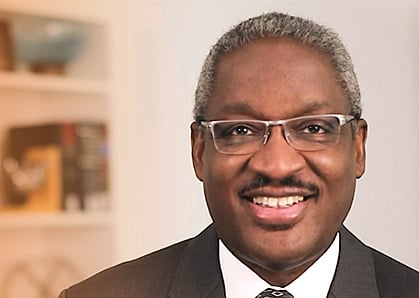Inspired by A Passion for the Community
It's somewhat hard to fathom how Albert E. Dotson Jr. has time to practice law.
Dotson's day job is attorney, handling government procurement and real estate development at Bilzin Sumberg.
But community involvement is the area where he has really made his mark on Miami. He is president-elect of the Orange Bowl Committee, heads 100 Black Men of America, and chairs both the Overtown Youth Center and the Miami Dade College Foundation.
His father, Albert E. Dotson Sr. is a longtime Miami civic activist, too. In 1971 the elder Dotson became the first black manager for Sears, in Chicago. His career eventually took him to a Sears store in Hialeah.
Like his son, he headed the Orange Bowl Committee -- serving a one-year term in the late 1990s. He's on the boards of Barry University and Florida International University.
Today, the father heads Puryear management consulting firm.
Q: Just so everyone doesn’t think we're interviewing your father, give us your background.
A: I was born in Detroit. My family eventually settled in Miami.
I went to Palmetto High, where I played basketball. I hit a free throw to put the Killian game -- our archrivals-- into overtime.
The first piece of mail [from college recruiters] I got was from Dartmouth. They contacted me because of academics, not basketball.
At Dartmouth I majored in economics. After that I worked at Xerox, then I went to Vanderbilt University Law School and returned here to Miami in 1987.
I recognized that law was both a good training ground and an opportunity to see how business operates.
I was the first in my family to (graduate) college. My parents sacrificed a lot for me and my four siblings to go.
Q: What motivates you to volunteer?
A: The reason for this involvement is passion and love for community. I'm not sure how I ended up with the right group of people, but I did. Bilzin Sumberg promotes that. And it’s a family passion, getting involved in the community, something I saw growing up.
It is, I think, irresponsible to have attended Dartmouth and Vanderbilt and practice law and not allow yourself time to give back to the community.
When you're in a community that spends more building prisons than schools then we have an issue with public priorities.
Q: When you returned to Miami in 1987, racial and ethnic relations were at a low point. Miami is a poor city of diffuse power, and you had lived in Chicago and Detroit, where black power structures were much more developed and established. How did that affect you in your civic involvement?
A: First, you have to decide how to proceed in life. Maybe Miami didn’t have the socioeconomic infrastructure of other cities. I'm actually glad I don’t have to go to one person or one entity all the time.
Having a more diverse pool to pull from presents more opportunities. You can't overlook the individual giver. When your with a firm with 95 lawyers, it gives you access to a very diverse universe.
Its just a matter of remaining focused on a vision, recognizing that certain visions may not be realized in your lifetime.
What I recognized Miami had is [that] Miami, relatively speaking, is a young town and theres still an opportunity for people without lineage to get involved.
But as a young city… comes growing pains, working through that growth.
There was a time when people were more concerned about the brain drain out of the community.
Q: You've been very active in Overtown community development, but there are skeptics who are concerned that the current plans could lead to displacement of the longtime, but less affluent, residents. Why is the plan to build luxury condos and commercial structures good news for that community.
A: To exclude Overtown from the development around it would also be a mistake, but its important that what is developed is respectful of the history of Overtown.
The problem with saying there is "a" plan is it misses the point. There are numerous plans for development in Overtown. There may have been a number of plans that were considered controversial. But none has broken ground yet.
The Black Archives has restored the Lyric Theater. We have a number of lawyers involved in that. One of its projects includes a mixed-use development that includes the Lyric Theater.
The Overtown Youth Center is part of the changing landscape in Overtown, and we've been part of that since the beginning. [Developer] Marty Margulies, who's a client, wrote a check for that. He talked about the need to build a facility without public funding. Alonzo Mourning, who's a client and friend, stepped in. Lennar is actively involved, and Stuart Miller [Lennar's chairman] sits on the board.
There is a need for workforce housing, retail and other opportunities.
There's the Overtown Transit Village next to the Metrorail station, where you have the chance to bring the talents of this firm to development of the community.
Q: What do you see Miami being in 20 years? What, particularly, is your view of the future of the historically black communities as they face gentrification and the loss of longtime residents?
A: You hear a lot about the Manhattanization of Miami. Clearly, we will be a more vertical city, and that will bring with is a completely different lifestyle. Those who want to preserve a horizontal lifestyle will probably lose that battle.
I see a Miami that embraces its diversity.
With black communities, we have a lot of different pockets, Overtown, Richmond Hrights, Opa-locka. As there continues to be development, I think those areas must be preserved, with new residents respecting that preservation.
I do see those communities participating in that redevelopment. You can't watch redevelopment around those areas and say people who live there aren’t allowed to participate.
